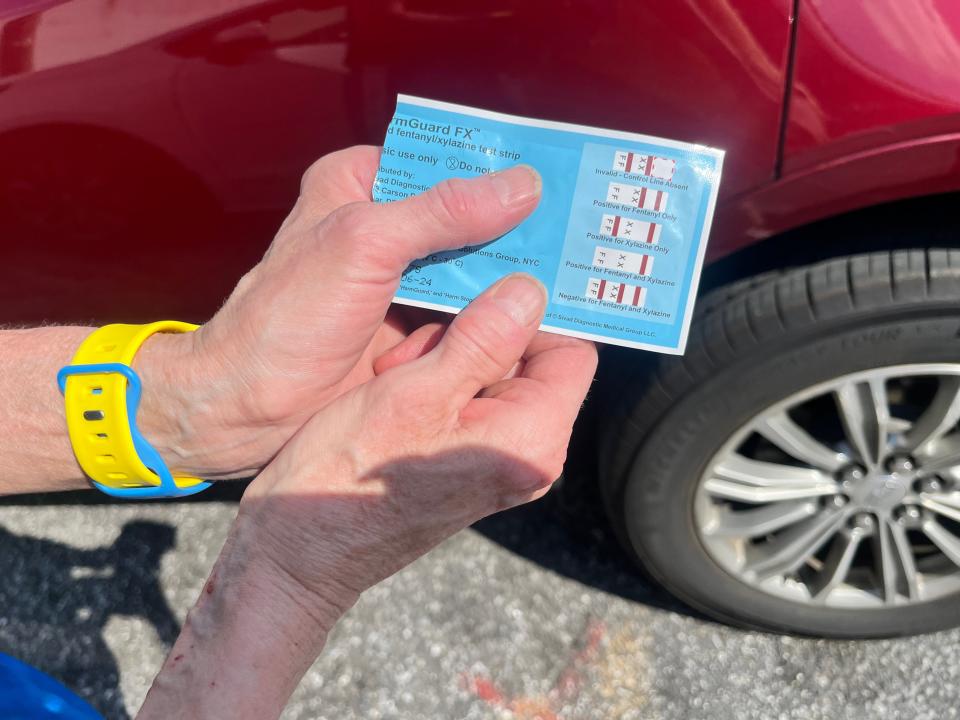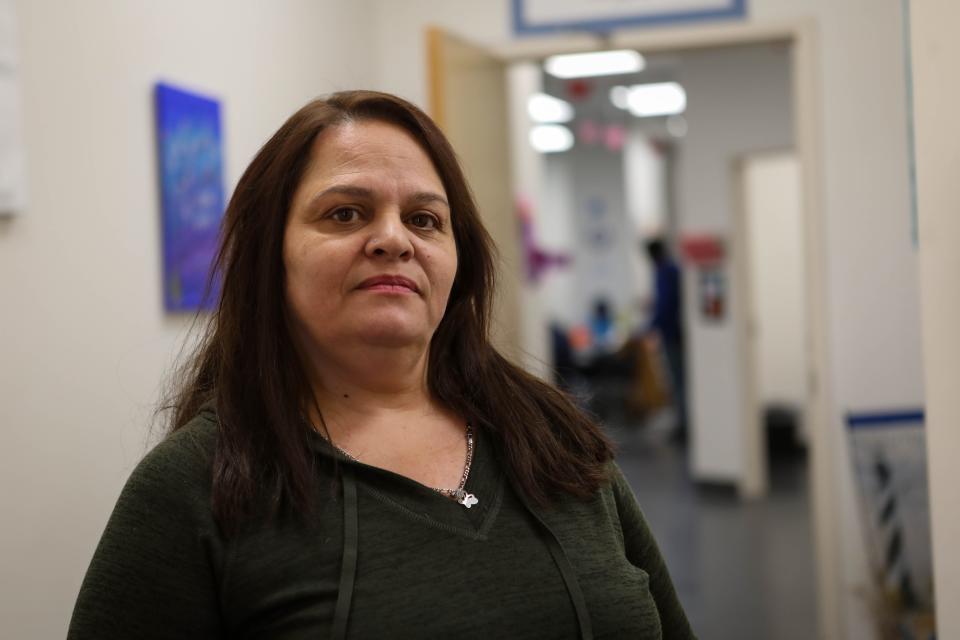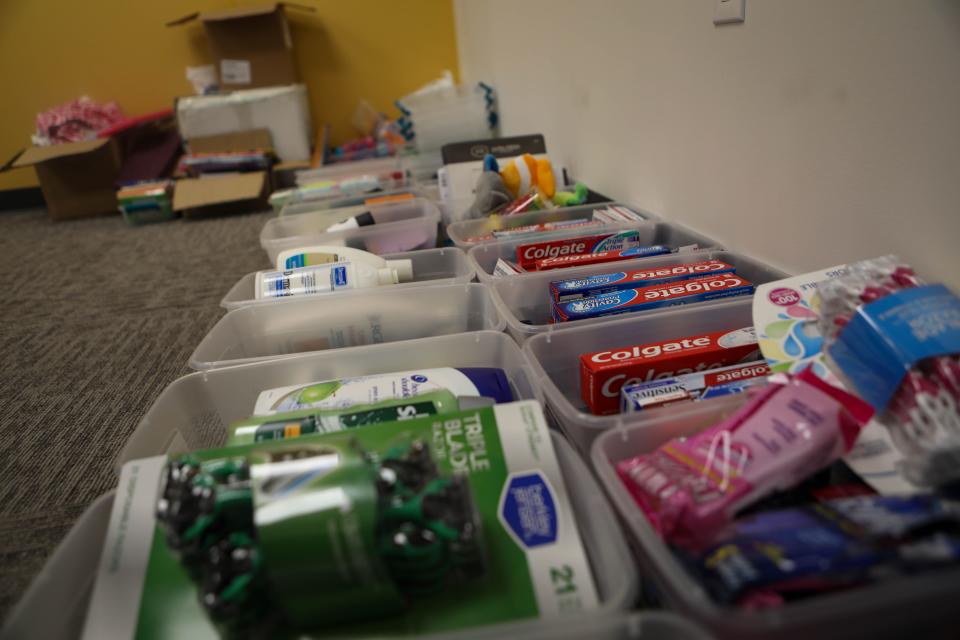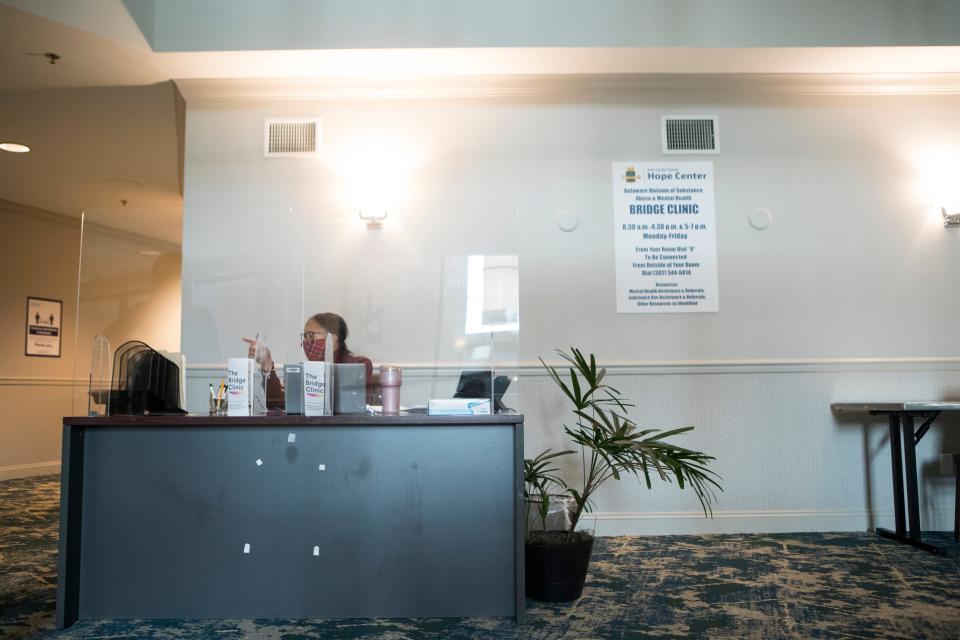Homelessness and addiction are intertwined. How state, local organizations plans to help
Two-thirds of Delawareans accessing federal grant-funded addiction services in the last fiscal year did not have stable housing, and 7% were living on the street.
These statistics from the Delaware Department of Health and Social Services formed the backbone of the department's first Opioid Response Briefing of 2024, which was held Monday morning.
"Homelessness and substance use disorders in and of themselves are serious, critical issues," said DHSS Secretary Josette Manning. "When they are combined, it's (an) even higher hurdle."
Joanna Champney, director of DHSS' Division of Substance Abuse and Mental Health, said that homelessness and unstable housing — which the division defines as not having long-term housing, such as living on the street, living in a shelter or institution, staying with someone else or residing temporarily in a halfway house — can negatively impact peoples' addiction treatment outcomes.

It also puts people at a higher risk of overdosing, Champney said, as they may be using drugs in a more isolated area or have less access to phones to call for help, whether for themselves or others. It's why local organizations, whether state-affiliated or not, are making increased efforts to spread the opioid overdose-reversing drug naloxone, more commonly known as Narcan, when providing outreach to people experiencing homelessness.
New harm reduction efforts from the state
The Substance Abuse and Mental Health division will be rolling out a new initiative in the spring to widen access to resources for the state's homeless population: harm reduction vending machines.
Harm reduction is a strategy that seeks to lessen the negative effects of drug use by providing people in active addiction with the tools to use safely in the hopes of keeping people alive and without diseases like hepatitis C and HIV—which are often spread when people share needles or use dirty ones—until they are ready to enter treatment.
Champney explained that the vending machines will provide free Narcan, fentanyl and xylazine test strips, condoms, dental hygiene kits and pregnancy tests. The opioid-specific resources will always be available, and the other items, which will be donated by partnering agencies, will be available while supplies last.
The locations of the vending machines and other information about how to access them will be released closer to their unveiling in the spring, Champney said.
The division currently provides these resources and other help through its four Bridge Clinics, which offer drop-in services like peer support, transportation, food, wound care and other harm reduction resources to homeless or displaced people.

The mobile bridge team is also set up outside both prisons in New Castle County, hoping to assist the high rate of people who lack stable housing upon their release. Sharon Bell, the division's Community Programs Manager, said they plan to expand these services outside correctional facilities downstate soon.
"We as a community need to provide continuous support, compassion and empathy. I stand here with my team united in a belief that the collective action can decrease homelessness and substance use disorder, saving lives in the process."
Existing efforts to help those struggling with homelessness, addiction, mental illness
The Substance Abuse and Mental Health division helped 675 people with mental health issues, including co-occurring substance use disorders, experiencing homelessness with the Projects for Assistance in Transition from Homelessness, or PATH, program last year, the division said Monday.

HOMELESSNESS: Milford hearing Jan. 22 on proposed tiny home village for homeless, like Georgetown site
The federally funded program combines street outreach programs geared toward people living outdoors or in non-traditional settings and in-reach programs at sites frequented by people experiencing housing instability, such as shelters, libraries, community resource centers, hospitals and peer recovery centers.
Delawareans helped by the PATH program receive a diagnostic screening and referrals to resources such as housing services, mental health and substance abuse treatment, health insurance access and social services.
The grant money is not just awarded to state-run programs. Local organizations can apply for funding to support their own efforts to assist people experiencing homelessness in Delaware.
Local organizations expand on state efforts
Horizon House, one of these grant recipients, provides services in all three Delaware counties, as well as in six counties in Pennsylvania.
Horizon House Program Director Denise Rodriguez said the organization operates a peer-run drop-in center where people experiencing housing instability or homelessness can shower, get a free meal and talk to someone about whatever issues they're facing.

Rodriguez said she lost someone in her own family to addiction. He didn't have access to the type of resources that organizations like Horizon House provide.
"I make it my duty, whoever I'm dealing with that comes through the doors at our center, that we greet them like that's my family member because I know that somebody's daughter," Rodriguez said. "Somebody's son."
Bringing resources into the community
Horizon House has recently expanded its outreach efforts, including by partnering with the Substance Abuse and Mental Health division's Bridge Clinics to bring assistance directly to those living on the street.
Rodriguez said it can be difficult to gather the resources needed by people experiencing homelessness as just one organization. Donations of sleeping bags, blankets and clothes as well as connections with places like Wawa and Chick-fil-A can help Horizon House to provide hot meals and other resources, "but it's not enough."
"We (agencies) need to continuously connect with one another because we have a common goal," Rodriguez said. "And if one person goes out, it doesn't make as much of an impact as if 10 people go out."

MORE: From patent to Percocet: How this powerful opioid got its start in Delaware
Delaware Housing Alliance Executive Director Rachel Stucker agreed.
Her team of 15 spends half their day just responding to calls, emails and texts from people who are homeless or at risk of being unhoused, trying to connect people to housing resources and emergency shelters. But most of the time, the non-profit is unable to get people to the help or shelter that they need.
"It's not because we don't want them to," Stucker said. "It's because there are not sufficient resources to meet the need."
How can you help?
It's not uncommon to see someone on the side of the road in Delaware, particularly in busy areas, asking for money or other assistance. Manning explained that even if you don't want to give someone cash, there are other ways you can help.
Nonperishable food, socks, hats or blankets are often incredibly helpful to people experiencing homelessness, Manning said, and can be easily carried or kept in your car to give when you see someone in need.
You can also donate items to the Bridge Clinics, including sleeping bags, tents, tarps, toiletries and hand warmers. They are also looking for wound care materials, such as bandages or saline solution bottles. Donations are accepted at the Springer Building near New Castle on Wednesdays from 9 a.m. to 4 p.m.

MORE: Latest addiction reports show increased need among older Delawareans, minorities
How to find help
Delaware Hope Line: 833-9-HOPEDE for free 24/7 counseling, coaching and support, as well as links to mental health, addiction and crisis services. Resources also can be found on the Help is Here website.
Suicide and Crisis Lifeline: 988
SAMHSA National Helpline: 800-662-HELP (4357) for free 24/7 substance abuse disorder treatment referral services. Treatment service locators also are available online at findtreatment.samhsa.gov or via text message by sending your ZIP code to 435748.
Bridge Clinics: Free Bridge Clinics are located at the New Castle County Fernhook Building, open daily from 8 a.m. to 11:30 p.m.; the Hope Center, open Monday through Saturday from 8:30 a.m. to 5 p.m.; the James W. Williams State Service Center, open weekdays from 8:30 a.m. to 4 p.m.; and the Thurman Adams State Service Center, open weekdays from 8 a.m. to 4:30 p.m. More information is available on the Help is Here website.
Syringe Services Program: Mobile outreach sites are available statewide for free needle exchanges, HIV and hepatitis C screenings and treatment referrals. See the monthly schedule online at brandywinecounseling.com/ssp.
Send story tips or ideas to Hannah Edelman at hedelman@delawareonline.com. For more reporting, follow them on X at @h_edelman.
This article originally appeared on Delaware News Journal: Homelessness focus of latest opioid response briefing from Delaware

